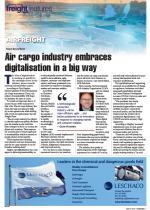Aero Africa has launched another service to Johannesburg, says regional operations manager Gary Tobias.The company has been on a drive to scale up its service offering for some time as part of its longer-term growth strategy.“The new service constitutes a level 1 blocked space agreement (BSA) out of Heathrow to Johannesburg on British Airways,” said Tobias. “The airfreight rates are unrivalled, and this kind of service cannot be found anywhere else in the ma rket , cur rently. “One of our key advantages is being able to build our own build-up (BUP) with our partner at Heathrow.”Tobias said this allowed the company great f lexibility in terms of airfreight rates and space offerings to its clients. “We’ve structured our rates in such a way that our service encourages co-loads, so we can attract not only charges-collect traffic, but also the prepaid traffic.”He told Freight News that clients were increasingly demanding this kind of f lexibility from their service providers. “They are also looking for more reliable services and affordable rates which existed pre-Covid-19. Although we are not over the pandemic yet, we understand the need for this and we’re striving to implement more products like our Heathrow to Johannesburg service to give them the options and alleviate some of the economic pressures currently experienced in the supply chain.”Tobias said the biggest challenge in the airfreight sector was still extremely high rates. “In South Africa, we are also facing serious space constraints into Johannesburg, particularly from the Far East.”He said that, ironically, this was currently where the most opportunity was being identified.“With the Chinese New Year having recently passed, we expect this market to open up.”The ongoing trials and tribulations experienced in the ocean freight sector continued to boost airfreight operations, added Tobias. “Seaport congestion and rising sea freight costs across the globe continue to entice greater airfreight movement. We have an extremely positive outlook at present, not only for the local airfreight sector, but also for airfreight at large.
Air cargo returning to pre-pandemic levels, albeit slowly
The International Air Transport Association (Iata) is reporting an increase in travel momentum as the world increasingly lifts Covid-19 pandemic restrictions. Whilst this build-up is mostly in the passenger sector, it also bodes well for air cargo as traditionally at least 50% of airfreight is transported in the bellies of passenger planes.The outbreak of Covid-19 saw some 75% of this airfreight capacity removed from the market due to the severe reduction in air travel that ensued, along with the overall grounding of passenger aircraft.“The capacity constraints we have seen in airfreight are slowly resolving as more passenger travel means more belly capacity for air cargo,” said Willie Walsh, Iata’s director-general.According to Iata, there has been a sharp, 11% increase in international tickets sold in recent weeks. This comes as more countries announce a relaxation of Covid-19 border restrictions. “The momentum towards normalising traffic is growing,” said Walsh. He emphasised the need for faster progress, saying the world remained far from 2019 levels of connectivity.Walsh said the ongoing restriction of air travel was negatively affecting economies as this was hampering their ability to trade – while at the same time, this had not stopped the spread of the virus. According to Iata statistics, demand for air cargo has continued to rise and at the last count when measured in cargo tonne-kilometres (CTK), was up 9.4%. With more airlines f lying again, capacity constraints on the airfreight market have eased somewhat, but the situation is still far from ideal.

